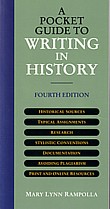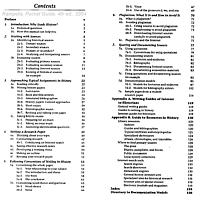Course description (jump down to schedule)
The History Department has the following definition in the UCSB general
catalog (link):
"The Proseminar. The particular skills of historians are the
ability to define issues, to gather information pertinent to a solution,
and to digest and report that information in a clear and well-conceived
argument. These skills, which are summed up by the word 'research,' are
especially cultivated in undergraduate proseminars, in which the entire
term is devoted to preparing a paper on a specialized topic of research.
Majors are required to take at least one such course during their career
here."
Thus a proseminar offers students the opportunity to actually do what
historians do: conduct original research and present their results orally
and in writing. This course is designed to help you through this process,
beginning with the selection of an appropriate topic of interest within
the broader theme of the course, and then with formulating questions about
that topic. After that we turn to research methods: how to find secondary
and primary materials, and how to analyze, interpret and organize our
findings. Finally, the seminar provides a forum for the oral and written
presentation of the results.
As far as possible these projects should draw on original source material
(e.g. diaries, letters, speeches, contemporary diplomatic and newspaper
reports, photographs, artworks, memoirs, autobiographies, etc.). Knowledge
of German is not required (although it is helpful!).
Requirements
- Attendance is essential. Regular exchange with your
scholarly peers and mentors is an important part of the research process.
You should always come to class meetings with your own agenda in mind:
the ideas, questions, and problems you wish to discuss.
Send an e-mail or leave a message on my office phone in advance of the class meeting should an emergency situation arise. - Several short written assignments (e.g. a prospectus--see
handout)
You will need to purchase at least one package of 4"x6" index cards. (index card handout) - An 8-10 minute oral presentation of the results of your research, based on a thesis paper.
- A research paper: ca. 20 text pages (double spaced,
1˝x1x1x1" margins, 12 pt. proportional space font), plus a bibliography
or primary sources, secondary books and articles.
A complete draft is due on Friday, May 21; a final version on Monday, June 7. - For extra credit, a final, corrected version can be published on the Papers page of course web site.
Grading: roughly half of your final grade will be based on the final paper. Roughly 25% each are based on classroom participation and timely submission of the various assignments.
 |
 |
Required Book
Mary Lynn Rampolla, A Pocket Guide to Writing in History
(Boston: Bedford, 2004), $14.20.
UCSB library: D13.R295 2004
This handy booklet gives advice about
how one can research, organize and write a history paper. It includes
examples of how to cite primary and secondary sources. Older
editions of this book are available, but they are different enough that
it is worth purchasing this fourth edition only. (Full
disclosure: the author used many of my suggestions for improvement and
thanks me in the preface.)
Plagiarism—presenting someone else's work as your own, or deliberately failing to credit or attribute the work of others on whom you draw (including materials found on the web)—is a serious academic offense, punishable by dismissal from the university. It hurts the one who commits it most of all, by cheating them out of an education. I will report offenses to the appropriate university authorities for disciplinary action.